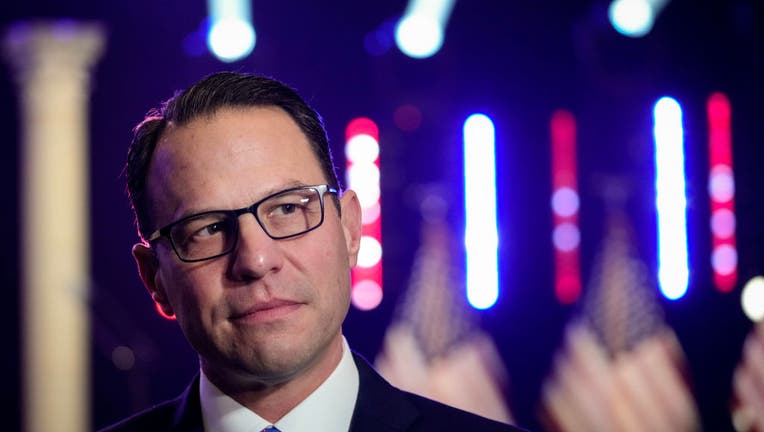Some states are seeking to restrict TikTok. That doesn't mean their governors aren't using it

BLUE BELL, PENNSYLVANIA - JANUARY 5: Governor of Pennsylvania Josh Shapiro prepares to speak during a television interview before U.S. President Joe Biden takes the stage during a campaign event at Montgomery County Community College January 5, 2024 ((Photo by Drew Angerer/Getty Images))
HARRISBURG, Pa. - POV: You’re on TikTok, and so is your governor — even as your Legislature considers banning the app from state-owned devices and networks.
Efforts to ban TikTok over security concerns about China's influence through the platform have picked up steam in the past year in state legislatures, with an expansive ban even proposed by Congress. In Pennsylvania, forward movement on a bill that first unanimously passed the state Senate last year could send legislation to the Democratic governor’s desk imminently.
But even as the app faces scrutiny and bans, governors and state agencies — and even President Joe Biden — are still using the app to promote their initiatives and expand their voting pool. Their target is the youth vote, or the people who largely make up the app's U.S. user base of 170 million.
Pennsylvania Gov. Josh Shapiro, a Democrat, is a prolific poster, with his efforts beginning on the campaign trail through a personal account. The first-termer is a rising star in the Democratic Party and is among governors building national profiles and possibly positioning themselves for a 2028 run for the White House.
His careful messaging extends to his official governor account on TikTok. All colored with his priorities and stances, videos have him participating in viral trends, breaking down aspects of his budget proposal, and even taking a dig at Texas via a Beyoncé song.
Other governors use TikTok accounts — among verified accounts, only Democrats — even in states that have banned the app from state devices and networks.
It isn’t surprising that politicians do use TikTok so much, said Anupam Chander, visiting scholar at the Institute for Rebooting Social Media at Harvard University. It’s more surprising that they don’t.
Such outreach draws its lineage to President Franklin Roosevelt’s fireside chats, when Depression-era Americans would gather around the radio to hear his voice. More recently, social media has been galvanized in elections, like former President Barack Obama on Facebook in 2008, or former President Donald Trump on Twitter, now X, in 2016.
"This is an app that can be very personal. You can share your walk to the Senate chambers or your exhilaration as a vote is passed. Or your disappointment when a vote fails," he said. "This is a way to reach people in a very personal way."
Former GOP presidential candidate Vivek Ramaswamy made early and, well, liberal use of TikTok during his campaign, with one young Republican saying his social media presence "made him popular."
"A lot of younger voters seem receptive to candidates such as Ramaswamy, due to his young age and new-generation agenda," Victoria Carlson, a spokesperson for the George Washington University College Republicans, told CBS News in September.
In Michigan, the app was banned in March 2023 from government devices — with certain exceptions, like Democratic Gov. Gretchen Whitmer's promotional account, which has brought cute dog videos, her March Madness bracket and news about her initiatives to her roughly 245,000 followers.
In New Jersey, a government-affiliated app posts jokes and memes. An exemption in New Jersey's law banning TikTok from government devices allows for posts from non-state networks, with permission. Other government accounts across the country have touted their state parks to drive tourism, events and small businesses.
In Pennsylvania, you have Shapiro and his steaming ‘Get S—t Done’ mug of tea — a nod to his edgy tagline — or slightly shaky footage as he records himself thanking teachers as his kids head back to school. As a play on the popular "point of view" videos where creators set up a scenario, Shapiro makes a concerned face with the overlaid text "POV: When extremists try to stop legal votes from counting."
"The governor believes, and this administration believes, that there should be no wrong door to accessing government," said Manuel Bonder, Shapiro’s spokesperson.
TikTok is part of that landscape, he said. The administration has a phone dedicated only to making TikToks, off of state Wi-Fi, with no other apps on it, Bonder said.
A TikTok spokesperson wouldn't be quoted by name about legislation banning the app.
In 2022, researchers found more than 100 accounts for those running for Congress. A majority were Democrats, said Maggie Macdonald, assistant professor of political science at the University of Kentucky.
"It seems to be, Democrats are exclusively having this debate, in terms of having an account and talking of banning it," she said.



